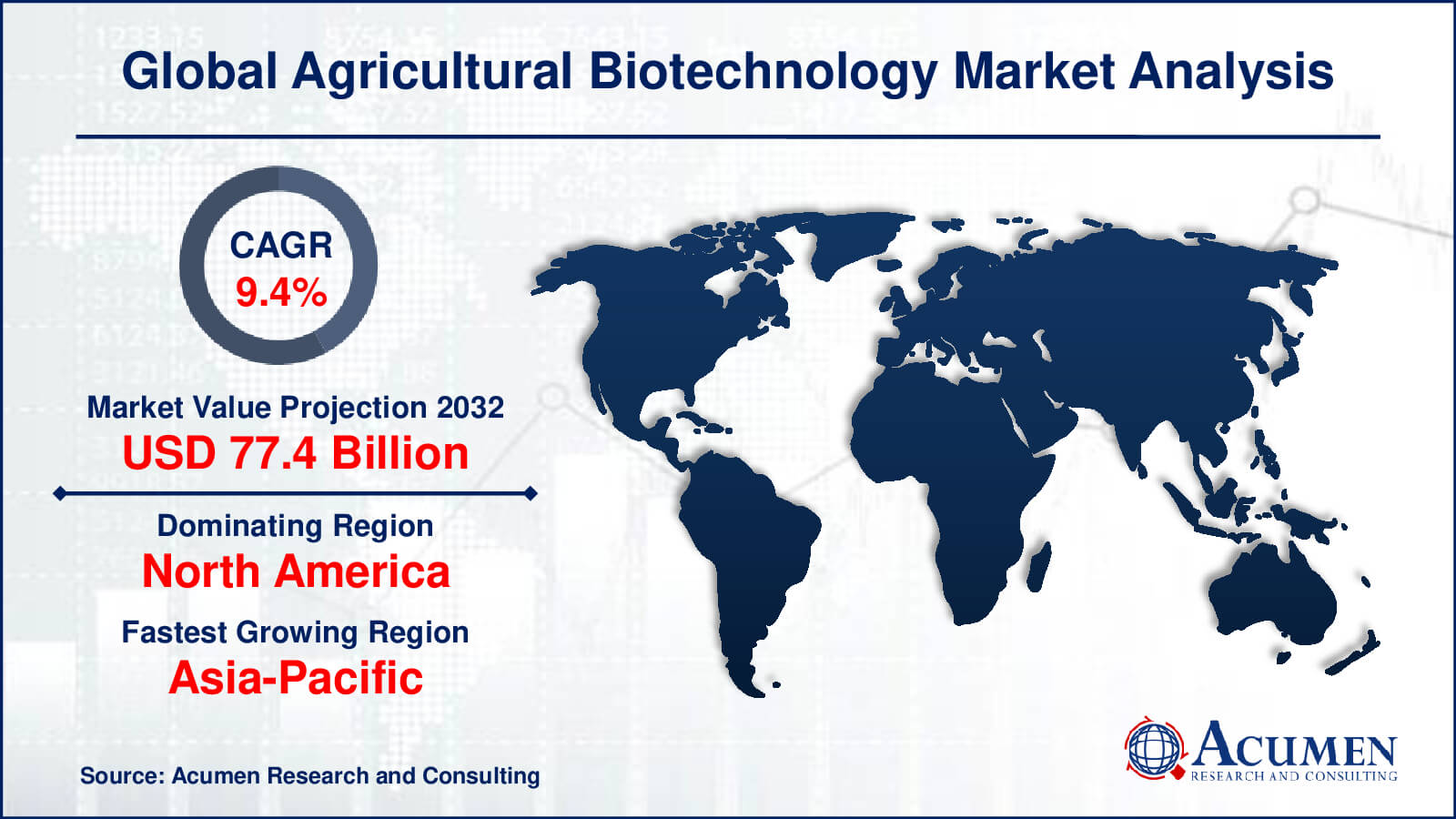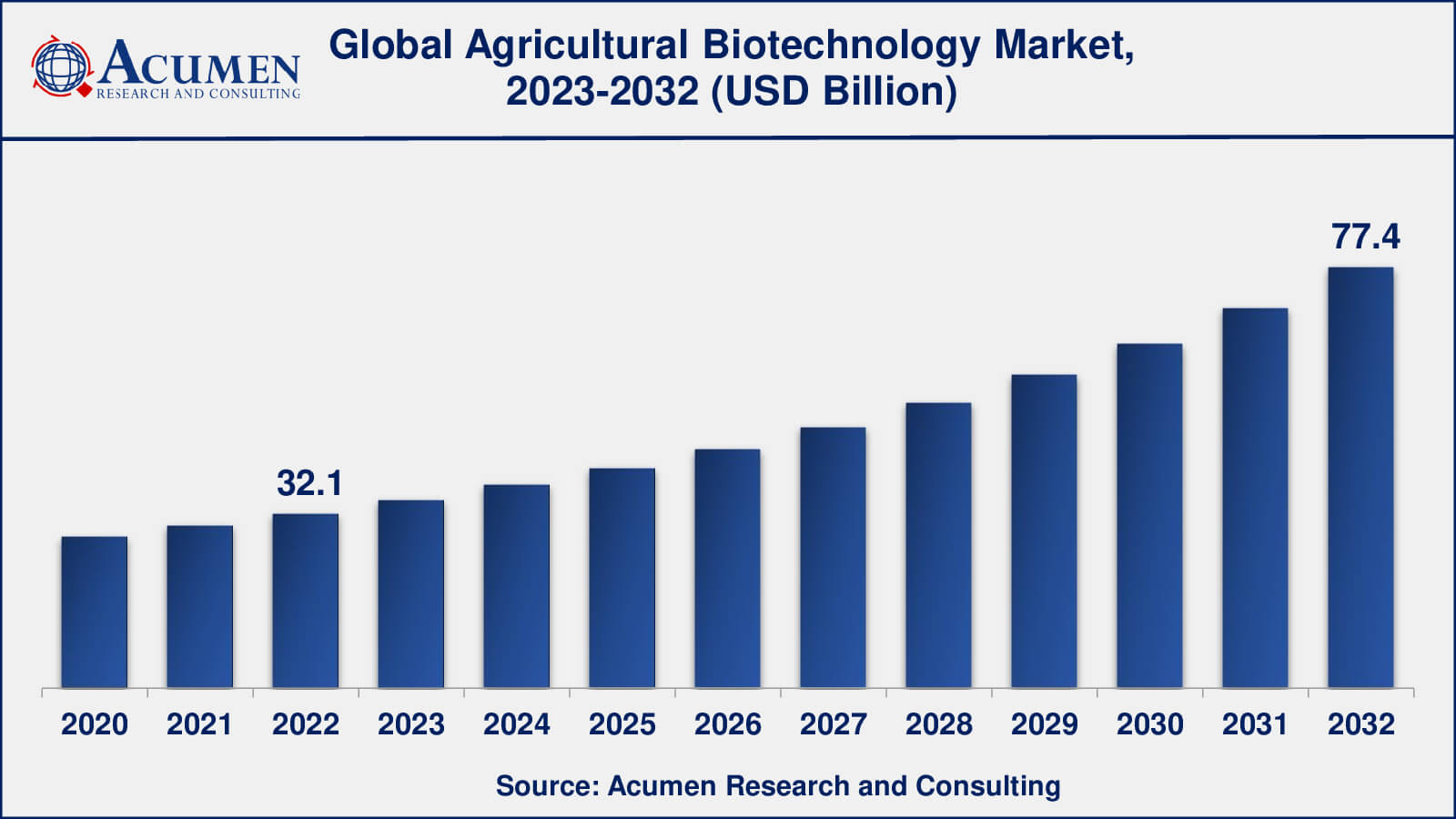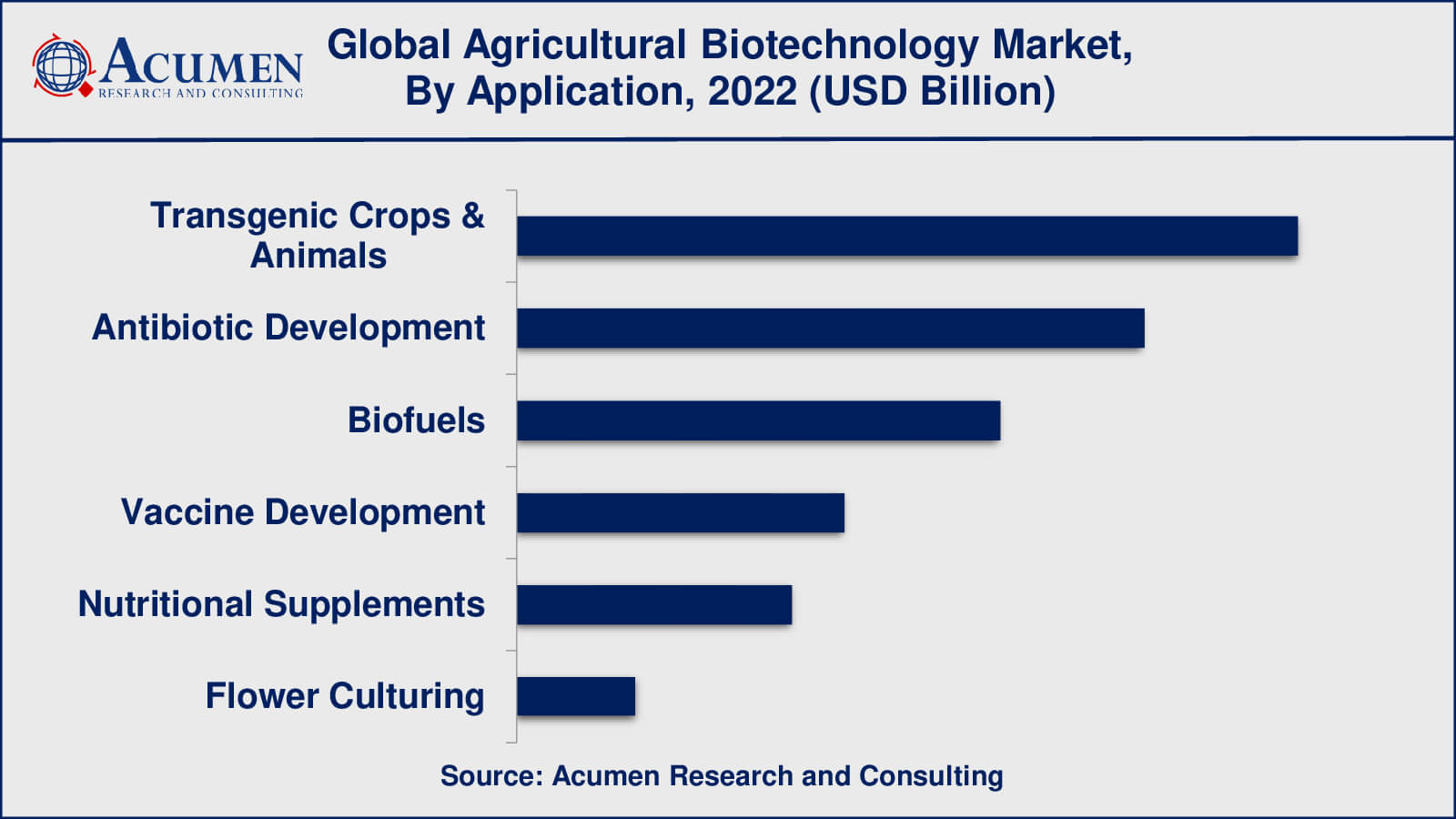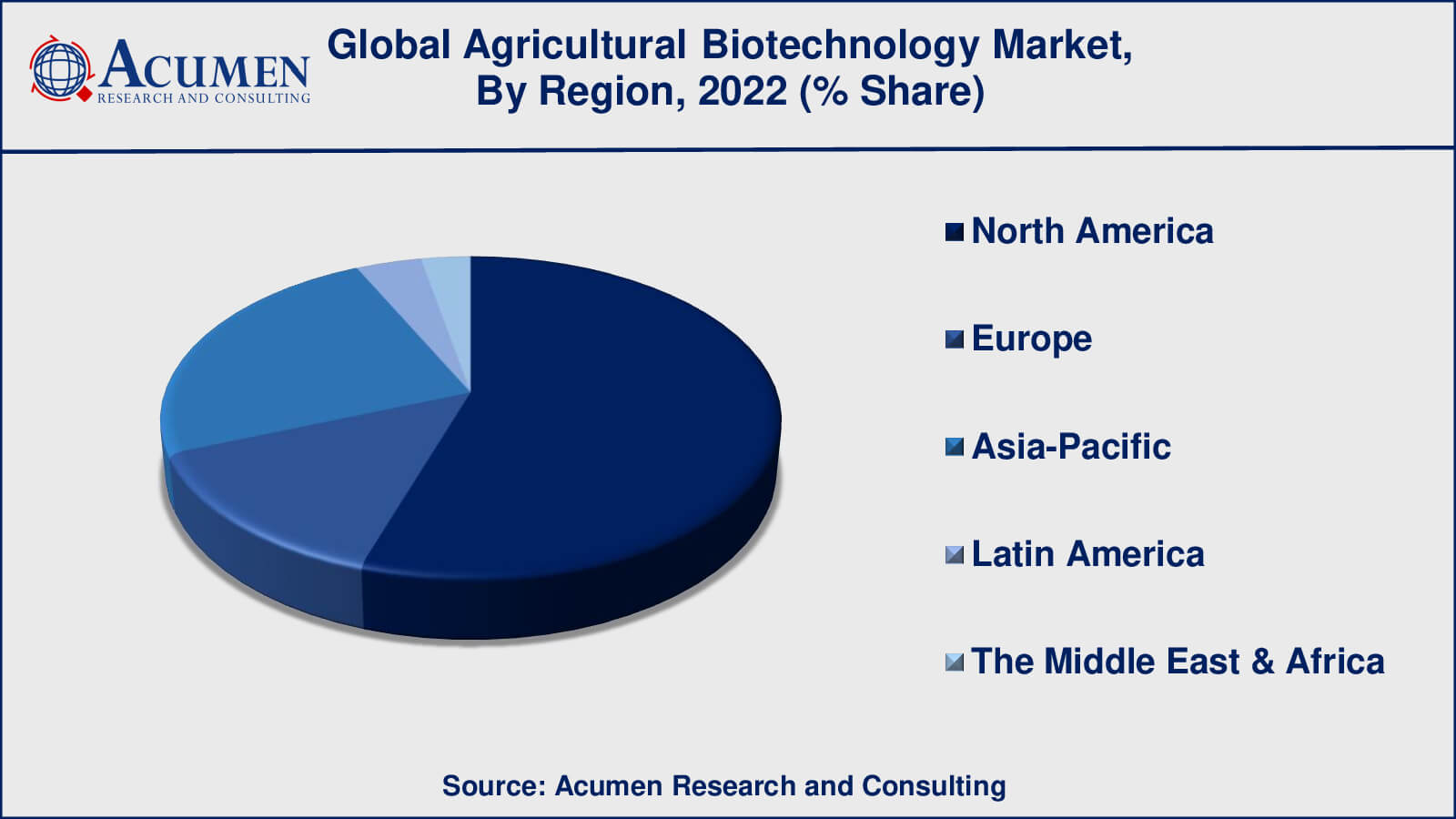Agricultural Biotechnology Market | Acumen Research and Consulting
Agricultural Biotechnology Market Size - Global Industry, Share, Analysis, Trends and Forecast 2023 - 2032
Published :
Report ID:
Pages :
Format :
The Global Agricultural Biotechnology Market Size collected USD 32.1 Billion in 2022 and is set to achieve a market size of USD 77.4 Billion in 2032 growing at a CAGR of 9.4% from 2023 to 2032.
Agricultural Biotechnology Market Report Statistics
- Global agricultural biotechnology market revenue is estimated to reach USD 77.4 billion by 2032 with a CAGR of 9.4% from 2023 to 2032
- North America agricultural biotechnology market value occupied more than USD 17.7 billion in 2022
- Asia-Pacific agricultural biotechnology market growth will record a CAGR of over 9% from 2023 to 2032
- Among organism type, the plants sub-segment generated around 40% share in 2022
- Based on application, the transgenic crops & animals generated US $ 9.6 billion revenue in 2022
- Growing interest in gene editing technologies is a popular agricultural biotechnology market trend that fuels the industry demand

Transgenic crops are formed by applying biotechnology on transgenic seeds by genetic modification. Transgenic crops have thus emerged as one of the dominant applications and are expected to maintain their lead due to the rising demand for food coupled with the unavailability of arable land. Genes in transgenic crops are inserted artificially and thus the plant doesn’t acquire them naturally through pollination. The sequence of genes is known as a transgene and is not compulsorily from the same plant with the inserted genes. A transgene can be from any other irrelevant plant or a completely different species of plant. In agricultural biotechnology, all the crops are modified genetically from their past condition by selection, domestication, and controlled breeding, thus offering more varieties of crops to consumers as compared to any natural process or cross-pollination. Crops produced through agricultural biotechnology provide longer shelf life, improved yield, resistance to pests, and high nutritional value due to which the supply-demand gap for food grains has reduced.

Global Agricultural Biotechnology Market Dynamics
Market Drivers
- Rising awareness of the benefits of genetically modified crops
- Growing demand for biofuels
- Surging demand for convenience foods
Market Restraints
- Concerns about biodiversity
- Limited research and development in some regions
Market Opportunities
- Increasing focus on precision agriculture
- Rising demand for sustainable agriculture
- Growing investment in research and development
Agricultural Biotechnology Market Report Coverage
| Market | Agricultural Biotechnology Market |
| Agricultural Biotechnology Market Size 2022 | USD 32.1 Billion |
| Agricultural Biotechnology Market Forecast 2032 | USD 77.4 Billion |
| Agricultural Biotechnology Market CAGR During 2023 - 2032 | 9.4% |
| Agricultural Biotechnology Market Analysis Period | 2020 - 2032 |
| Agricultural Biotechnology Market Base Year | 2022 |
| Agricultural Biotechnology Market Forecast Data | 2023 - 2032 |
| Segments Covered | By Organism Type, By Application, And By Geography |
| Regional Scope | North America, Europe, Asia Pacific, Latin America, and Middle East & Africa |
| Key Companies Profiled | Bayer CropScience, Certis USA, Dow AgroSciences, DuPont Pioneer Hi-Bred, Evogene, KWS SAAT Ag, Monsanto, Mycogen Seeds, Syngenta, and Vilmorin. |
| Report Coverage |
Market Trends, Drivers, Restraints, Competitive Analysis, Player Profiling, Covid-19 Analysis, Regulation Analysis |
Agricultural Biotechnology Market Growth Factors
Agricultural biotechnology involves the use of scientific tools which can be used on plants or living organisms to improve overall agricultural productivity. It is highly used in transgenic or genetically modified crops and has benefitted producers, farmers, as well as consumers by providing better crop quality and high yield. Agricultural biotechnology is also known as agritech and is a vast field that involves the use of scientific techniques and tools including molecular markers, vaccines, genetic engineering, tissue culture, and molecular diagnostics. Required traits are imported from a species of the crop to a different species. Transgene crops possess desirable properties such as growth rate, flavor, size of harvested products, the color of flowers, and resistance to pests and diseases. Based on research on DNA, researchers and scientists have employed various solutions to increase overall agricultural productivity by identifying genes to confer the ability to work with such properties precisely enough and advantages on several crops and to make improvements in livestock and crops. Improvements made in the overall crop yield are not possible using conventional techniques.
Increasing agricultural demands due to expansion in the global population are anticipated to complement the demand for agricultural biotechnology over the forecast period. Rising demand for biofuel owing to less abundance of conventional energy resources is further expected to drive the global agricultural biotechnology market growth. Increasing demand for animal feed due to an increase in non-vegetarian food consumption along with changing food habits is a key factor propelling the growth of the global agricultural biotechnology market over the forecast period. However, opposition to genetically modified foods in some regions is a major aspect hindering the growth of the global agricultural biotechnology market and can pose a serious challenge to industry players during the forecast period.
Increasing capital investments in the advancement of agricultural biotechnology techniques are expected to pose bright opportunities for industry players in the global agricultural biotechnology market. Moreover, increasing demand for transgenic crops owing to the rise in demand for advanced and modified food is projected to fuel the global agricultural biotechnology market. In addition, the patent-protected industry is expected to limit the overall growth of the market. Furthermore, an increasing number of research and development activities being carried out in opportunistic regions such as Africa and Asia-Pacific is expected to be a key opportunistic factor over the forecast period. The application of agricultural biotechnology on crops using genetic modification has affected the development of transgenic crops since transgenic seeds offer better productivity of crops than traditional seeds.
Agricultural Biotechnology Market Segmentation
The worldwide agricultural biotechnology market is categorized based on, organism type, application, and geography.
Agricultural Biotechnology Market By Organism Type
- Plants
- Animals
- Microbes
According to the agricultural biotechnology market forecast, plants will dominate the agricultural biotechnology market in terms of application. This is due to the fact that plants are the primary focus of agricultural biotechnology research and development, with a strong emphasis on developing genetically modified crops that can resist diseases and pests tolerate herbicides, and have improved nutritional content. For several decades, the agricultural biotechnology industry has prioritized the development of transgenic crops. GMO crops such as corn, soybeans, and cotton are now widely grown and play an important role in modern agriculture. However, there is also considerable interest in the application of agricultural biotechnology to other areas, such as animals and microbes. The use of genetically modified animals to improve meat and dairy production, for example, is gaining popularity, as is the development of microbial products for agricultural use, such as biofertilizers and biopesticides.
Agricultural Biotechnology Market By Application
- Antibiotic Development
- Flower Culturing
- Nutritional Supplements
- Transgenic Crops & Animals
- Vaccine Development
- Others

According to our agricultural biotechnology industry analysis, transgenic crops and animals have historically dominated the agricultural biotechnology market. This involves the use of genetic engineering to develop crops and livestock with desirable traits such as resistance to pests, tolerance to herbicides, and improved nutritional content. The development of transgenic crops and animals has been a major focus of the agricultural biotechnology industry for several decades, and there are now many commercially available transgenic crops, such as genetically modified corn and soybeans. However, other areas of agricultural biotechnology are also seeing significant growth
Agricultural Biotechnology Market Regional Outlook
North America
- U.S.
- Canada
Europe
- U.K.
- Germany
- France
- Spain
- Rest of Europe
Asia-Pacific
- India
- Japan
- China
- Australia
- South Korea
- Rest of Asia-Pacific
Latin America
- Brazil
- Mexico
- Rest of Latin America
The Middle East & Africa
- South Africa
- GCC Countries
- Rest of the Middle East & Africa (ME&A)

Agricultural Biotechnology Market Regional Analysis
The US is a major player in the agricultural biotechnology market, with many large biotechnology companies headquartered there. Canada is also involved in the research and development of transgenic crops and animals. Many European countries, including France, Germany, and the United Kingdom, are active in the agricultural biotechnology market. In Europe, however, there is strong opposition to genetically modified crops, and regulatory frameworks are relatively strict. China is one of the largest markets for transgenic crops, and other countries in the region, such as India and Japan, are investing heavily in agricultural biotechnology. Brazil is a significant player in the agricultural biotechnology market, having invested heavily in the development of transgenic crops such as soybeans. Argentina is also involved in this field. Many countries in this region are still in the early stages of developing agricultural biotechnology, but there is a growing interest in the creation of transgenic crops and other biotechnology applications.
Agricultural Biotechnology Market Players
Some of the key players in the global agricultural biotechnology market include Bayer CropScience, Certis USA, Dow AgroSciences, DuPont Pioneer Hi-Bred, Evogene, KWS SAAT Ag, Monsanto, Mycogen Seeds, Syngenta, and Vilmorin.
Frequently Asked Questions
How big is the agricultural biotechnology market?
The agricultural biotechnology market size was USD 32.1 Billion in 2022.
What is the CAGR of the global agricultural biotechnology market during forecast period of 2023 to 2032?
The CAGR of agricultural biotechnology market is 9.4% during the analysis period of 2023 to 2032.
Which are the key players operating in the market?
The key players operating in the global market are Bayer CropScience, Certis USA, Dow AgroSciences, DuPont Pioneer Hi-Bred, Evogene, KWS SAAT Ag, Monsanto, Mycogen Seeds, Syngenta, and Vilmorin.
Which region held the dominating position in the global agricultural biotechnology market?
North America held the dominating position in agricultural biotechnology market during the analysis period of 2023 to 2032.
Which region registered the fastest growing CAGR for the forecast period of 2023 to 2032?
Asia-Pacific region exhibited fastest growing CAGR for agricultural biotechnology market during the analysis period of 2023 to 2032.
What are the current trends and dynamics in the global agricultural biotechnology market?
The current trends and dynamics in the agricultural biotechnology industry include rising awareness of the benefits of genetically modified crops, growing demand for biofuels, and surging demand for convenience foods.
Which organism type held the maximum share in 2022?
The transgenic crops and animals organism type held the maximum share of the agricultural biotechnology market.



